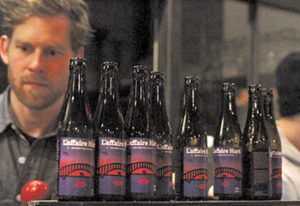The name Hart is legendary in Quebec for being the first Jewish family to settle here and producing a scion that fought for equal political rights for Jews.
But how many know that the same Ezekiel Hart of Trois-Rivières, who was elected three times to the Legislative Assembly of Lower Canada between 1807 and 1809 and prevented each time from taking his seat, was also a brewer?
Ezekiel and his brothers Moses and Benjamin, sons of patriarch Aaron Hart, who is generally believed to have arrived in New France with the conquering British army in 1760, founded a brewery in Trois-Rivières that they owned for more than 30 years.
That fact, documented in historical records, came as a pleasant surprise to Toronto lawyer Gary Gillman, whose passion is beer and its history.
While researching brewing in Quebec under the British regime, Gillman, a Montreal native, came across mention of the M. and E. Hart Company in online sources and was delighted to learn that it was indeed established and run by the family, which he had grown up admiring for its pioneering spirit.
The company was established in 1796 and was sold in the 1830s to Dow, a major brewery in Montreal, which in turn was acquired by what is now Molson Coors.
But there was more to delight Gillman: an original recipe for Hart ale was extant, preserved in the Bibliothèque et Archives nationales du Québec (BANQ) in its Quebec City premises.
That crumpled piece of paper, perhaps the back of an invoice, had been digitized, and Gillman found it on BANQ’s website. He trembled as he read the slightly faded, but legible, precise instructions – handwritten in English – on how to make an all-barley malt brew: ingredients, measurements, temperature, etc.
In February, Gillman posted an essay on his beer blog beeretseq.com, which he created 1-1/2 years ago, sharing the exciting news about the Hart brewery and the discovery of the recipe. He figures it dates to around 1800, which he believes makes it the oldest surviving artifact for commercial beer in Canada, if not North America – at least in public hands.
READ: HISTORY ON AN INTIMATE SCALE
Meanwhile in Montreal, Magdalene Klassen, a young woman who was doing research at the Museum of Jewish Montreal (MJM) on foods related to the community was idly Googling when she came across Gillman’s post. She found it intriguing, even though she admits she’s not that keen on the suds.
But MJM director Zev Moses and Kat Romanow, head of the associated Wandering Chew Jewish food initiative, did recognize that this could turn into a fun and educational project. MJM was founded in 2010 to collect and share online stories about Jewish Montreal (and Quebec).
This summer MJM opened its first physical space on St. Laurent Boulevard, and directly across the street, on Duluth Avenue, is Réservoir, a trendy microbrewery and pub.
They proposed to the artisans that they recreate the ale.
Co-owner Michel Zabitsky and brew master Nathan McNutt seized the opportunity, recognizing that recipe as a hallowed relic passed down from those who came before in the ancient brewing tradition.

After a couple of months of finessing the product, on Oct. 26, the reborn brew made its festive debut before a full house at MJM, which included historian and one-time Parti Québécois cabinet minister Denis Vaugeois, probably the leading authority on the Hart family, and one of its contemporary members, playwright David Gow, who lives in the Eastern Townships. He is proudly a direct descendant of Moses Hart, on his mother’s side, and an eighth-generation Quebecer.
Many of the Harts assimilated and/or scattered throughout North America.
The beer is called L’affaire Hart – as Ezekiel’s travails, which eventually led to the 1832 legislation formally affirming Jewish political rights, became known – with the subtitle “Une bière trifluvienne,” a nod to its Trois-Rivières origins.
The label features the city’s landmark Laviolette arched bridge and provides a bit of history on the Harts.
At the tasting that followed at Résevoir, Gillman’s verdict was that this light amber ale is in keeping with way it was made in England, especially in the country, at the time. That is not to say that only anglophones drank it, since Quebecers generally would have been accustomed to that style, he added.
L’affaire Hart has a high alcohol content – 8.6 per cent – and is pretty heavy on the hops, giving its after-taste a real kick.
All ingredients are Quebec sourced and organic – after all, there were no pesticides in the Harts’ era.
McNutt explained that its “funkiness” can be attributed to a wild yeast called brettanomyces, and its complexity to being aged in oak casks. He smoked the malt with apple wood chips to imitate the fire kilns of yesteryear.
The brew master said he was as faithful as could be to the directions, but had to make certain modifications, mainly for sanitation reasons. Stainless steel tubs and electricity were used, rather than wooden barrels, to which hot stones were added to heat the mash.
Gillman said the formula may be more than 200 years old, but L’affaire Hart resembles the assertively flavoured craft beers young people enjoy quaffing today.
READ: SODASTREAM LOOKS TO CONQUER BEER MARKET WITH NEW HOME BREWING SYSTEM
“That’s because these are not a new gimmick. Microbrewers are returning to the authentic way beer was made before it became mass produced,” said Gillman, who applauds the youthful people at MJM for “honouring brewing and Jewish history in Quebec in one stroke.”
Réservoir has made 80 litres of the stuff for MJM. If it catches on, Zabitsky said they may cook up another batch.






